Talking Points
Programs
Objectives:
- Students should understand that many products in their own homes are poisonous.
- Poisons can look, smell, and/or taste good.
- Poisons can be eaten, inhaled, spilled on skin, or splashed in the eyes.
- Students should understand basic first aid for poisonings.
Develop interest:
Ask about the Poison Help logo and what it means. Do they know, if there might be a poisoning, you can call 1-800-222-1222 anywhere in the United States and talk to the nearest poison center? Has anyone they know ever called a poison center?
Poison Talk
Accidents are the leading cause of death for children under the age of 14. More children die annually from preventable injury than from all childhood diseases combined. Children are hurt and killed in traffic as motor vehicle passengers, pedestrians, and bicyclists. They suffer from burns, drowning, choking, falls, and poisoning.
Each year, poison centers handle over 1 million potentially poisonous exposures in children.
These poisonings, like all accidents, can be prevented.
Discussion points:
- What is a poison? (something that can harm you when exposed)
- Poisons are all around us, in the house (medications, household chemicals), the garage (insecticides, car products) and outside (plant and mushrooms)
- People can be exposed (poisoned) four different ways: by eating a poison (mushrooms), inhaling a poison (bug spray or smoke), spilling a poison on the skin (cleaners, car chemicals), or spraying something in the eyes (glass cleaner).
- Some poisons are obvious, such as the household cleaner. However, some poisons are not obvious. It’s easy for young children to confuse poisons with something safe. Medicine can taste or look like candy, glass cleaner looks like a blue sport drink, mouthwash smells minty, poisonous mushrooms look like mushrooms from the grocery store.
- Poisons can smell good, such as mouthwash or perfume. Poisons can taste good, such as medications. Poisons can look pretty, such as glass cleaner.
- Medications and vitamins can be dangerous when more than the recommended dosage is taken. Some medications can be life threatening with just 1 tablet.
- People who have been poisoned may not look sick. Some poisons do not hurt the person right away. Even if the person appears fine, always call the Poison Center.
- Be prepared, have the Poison Center phone number 1-800-222-1222 on or near the phone so that it can always be found easily.
- Most people do NOT have to go to the hospital when they are poisoned.
- Pets can be poisoned, too.
What to do if you witness/suspect a poisoning?
First take the poison away, then:
- If ingested: give some some water to drink
- If on skin: wash up area with soap and water
- If inhaled: get in fresh air
- if in eye: flush eye with slightly warm water.
Tell an adult.
Get help: Call 1-800-222-1222 or 911
Calmly explain what happened to the Poison Center person or 911 operator.
